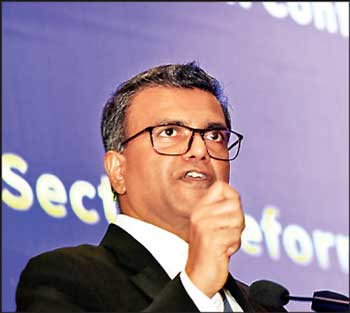Wednesday Feb 25, 2026
Wednesday Feb 25, 2026
Saturday, 4 October 2025 01:14 - - {{hitsCtrl.values.hits}}
 |
| Treasury Secretary Dr. Harshana Suriyapperuma – Pic by Shehan Gunasekara |
Sri Lanka’s economic recovery will continue to be anchored on fiscal discipline, with the Government preparing a set of governance, legislative and digital reforms to strengthen stability and sustain growth into 2026, Treasury Secretary Dr. Harshana Suriyapperuma said yesterday.
Addressing the Annual Conference on Public Sector Reforms for Economic Revival organised by CA Sri Lanka and the Association of Public Finance Accountants, he said the administration is operating under tight timelines, with the budget cycle underway and the IMF’s fifth review in progress.
“The good news is, as a nation, we are in a better place, much better than we were. One of the key reasons behind that achievement and the journey is the financial discipline. The present administration has implemented and is diligently following up on those lines to make sure we will continue the journey better than how it was before,” he said.
The Treasury Secretary’s remarks come as the Central Bank reported the overall budget deficit for the first eight months of 2025 had fallen 54.9% year-on-year to Rs. 411 billion, compared with Rs. 911 billion a year ago.
Outstanding Government debt rose 3% in the first half of 2025 to Rs. 29.6 trillion, with domestic debt up 2.7% to Rs. 18.8 trillion and foreign debt up 3.8% to Rs. 10.8 trillion.
Treasury Bills outstanding fell 3.4% to Rs. 3.9 trillion while Bonds rose 6% to Rs. 14.9 trillion.
Dr. Suriyapperuma said that confidence was returning with businesses preparing to expand and foreign investors showing renewed interest. “Growth is taking shape, confidence is getting back into businesses to invest, for FDI to flow into the country, businesses to expand, capacity building at all levels to ensure ventures move to the next stage,” the Treasury Secretary added.
Reforms, both ongoing and planned, will be central to meeting these expectations. “Some of the reforms, we are in the middle of those reforms and some of the changes to the legislations and certain reforms are expected also. These reforms are in terms of legislature, in terms of enhancements to the governance structure, enhancements to the reporting frameworks,” he said.
Dr. Suriyapperuma cited the appointment of independent directors to State banks under a new framework as an example of governance improvements, noting that the initiative had the direct backing of the President and professional institutes.
“There are many such reforms that have been implemented and we are in the process of continuing to implement,” he added. Several new laws are being prepared for presentation to Parliament before the end of the financial year.
Strengthening capacity in the public sector, especially through professional qualifications and recognition of public finance accountants, was essential to improving governance and reporting. “We need to ensure team members have adequate capacity, understanding, continuous improvements and updates to their knowledge base,” he said.
Digitalisation was also highlighted as a cornerstone of reform. “Another key element is the digital journey, to have seamless engagements to obtain government service, to have seamless access to publish finances, whether it is a working day or weekend 24-7, whether you are in Sri Lanka or outside Sri Lanka, to have access to services through digital means. This is the modern Sri Lanka that we were waiting for, that journey has begun.”
He said political, economic and social stability were converging to provide a stronger foundation for citizens and businesses.
Despite near-term gains, medium-term risks remain from Sri Lanka’s restructured debt. The IMF has warned that macro-linked Bonds could add between $ 150 million and $ 270 million annually to debt service from 2028 until 2038 if GDP exceeds certain thresholds. Once triggered, these payments would continue even if growth later slows.
“In the case of Sri Lanka, the one-time adjustment nature of the macro-linked Bonds presents risks to Sri Lanka as higher payments after 2028, once triggered, would persist even if economic performance were to deteriorate thereafter,” the IMF said in a September working paper.
However, the Treasury Secretary was upbeat.
“We want to walk into 2026 with more confidence, with more opportunities, more options for citizens, businesses and enterprises, and the SME sector,” he told the conference.
“They can perform better, make more profits, hire more employees, in a modern Sri Lanka, a modern structure that is available for all, creating a level playing field for all businesses, whether they are competing from overseas or whether they are investors locally, to have the best products, invite best technologies, invite best capital pools to consider Sri Lanka as a vibrant destination for business engagements,” the Treasury Secretary said.